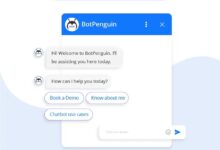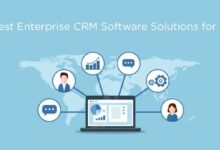AI-Powered CRM Software: 7 Revolutionary Benefits You Can’t Ignore
In today’s fast-paced digital world, AI-powered CRM software is transforming how businesses connect with customers. By blending artificial intelligence with customer relationship management, companies gain smarter insights, faster responses, and deeper personalization—without the manual grind.
What Is AI-Powered CRM Software?

AI-powered CRM software integrates artificial intelligence technologies—like machine learning, natural language processing, and predictive analytics—into traditional customer relationship management systems. This fusion enables businesses to automate tasks, anticipate customer needs, and deliver hyper-personalized experiences at scale.
Core Components of AI in CRM
The strength of AI-powered CRM software lies in its underlying technologies. These components work together to interpret data, learn from interactions, and make intelligent decisions.
- Machine Learning (ML): Algorithms analyze historical customer data to detect patterns and predict future behaviors, such as likelihood to purchase or churn.
- Natural Language Processing (NLP): Enables systems to understand and respond to human language in emails, chat, and social media, powering chatbots and sentiment analysis.
- Predictive Analytics: Uses statistical models to forecast outcomes like sales trends, customer lifetime value, and optimal engagement times.
Evolution from Traditional CRM to AI-Driven Systems
Traditional CRM systems were primarily databases for storing customer information and tracking interactions. While useful, they required manual input and offered limited insights. The shift to AI-powered CRM software marks a leap from passive record-keeping to active intelligence.
For example, Salesforce introduced Einstein AI in 2016, one of the first major CRM platforms to embed AI natively. Since then, platforms like HubSpot, Microsoft Dynamics 365, and Zoho CRM have followed suit, integrating AI to automate workflows and deliver real-time recommendations. Salesforce Einstein now powers everything from lead scoring to email optimization.
“AI is not replacing humans in CRM; it’s empowering them to focus on what they do best—building relationships.” — Marc Benioff, CEO of Salesforce
7 Key Benefits of AI-Powered CRM Software
The adoption of AI-powered CRM software is surging because it delivers measurable improvements across sales, marketing, and customer service. Here are seven transformative benefits that set it apart.
1. Hyper-Personalized Customer Experiences
AI analyzes vast amounts of customer data—purchase history, browsing behavior, social media activity, and more—to deliver personalized content, product recommendations, and communication timing.
For instance, an AI-powered CRM can determine that a customer prefers receiving promotional emails on weekends and is more likely to engage with video content. It then automatically adjusts the marketing strategy accordingly, increasing open rates and conversions.
Companies like Amazon and Netflix have long used AI for personalization, but now, AI-powered CRM software brings this capability to businesses of all sizes. According to a report by McKinsey, personalization can reduce acquisition costs by up to 50% and increase revenues by 5–15%.
2. Smarter Lead Scoring and Prioritization
One of the biggest challenges in sales is identifying which leads are most likely to convert. Traditional lead scoring relies on static rules (e.g., job title, company size), but AI-powered CRM software uses dynamic, data-driven models.
These systems evaluate hundreds of signals—email engagement, website visits, social media interactions, and even tone of communication—to assign real-time lead scores. This allows sales teams to focus on high-intent prospects, improving conversion rates and reducing wasted effort.
For example, HubSpot’s AI-powered CRM uses predictive lead scoring to help sales teams prioritize outreach. Businesses using this feature report up to a 30% increase in qualified leads.
3. Automated Routine Tasks
AI-powered CRM software excels at automating repetitive, time-consuming tasks such as data entry, follow-up emails, meeting scheduling, and call logging.
Voice-to-text transcription, for example, allows AI to automatically log call summaries into the CRM after a sales conversation. Similarly, AI can draft personalized email responses based on previous interactions, which sales reps can review and send with one click.
This automation not only saves hours per week but also reduces human error. A study by Nucleus Research found that CRM automation can deliver $8.71 for every $1 spent, primarily through increased productivity.
4. Enhanced Customer Service with AI Chatbots
AI-powered CRM software integrates intelligent chatbots that provide 24/7 customer support, answer common queries, and escalate complex issues to human agents.
These chatbots use NLP to understand customer intent and pull relevant information from the CRM—such as order history or past support tickets—to deliver accurate, context-aware responses.
For example, Zendesk’s AI-powered Answer Bot reduces ticket volume by 20–30% by resolving simple inquiries instantly. This improves response times and frees up human agents for more complex tasks.
5. Predictive Sales Forecasting
Accurate sales forecasting is critical for inventory planning, resource allocation, and revenue projections. AI-powered CRM software analyzes historical sales data, market trends, and pipeline health to generate highly accurate forecasts.
Unlike manual forecasting, which is prone to bias and inaccuracy, AI models continuously learn and adapt. They can flag potential risks—like a deal stalling in the pipeline—and suggest corrective actions.
Microsoft Dynamics 365 Sales Insights, for instance, uses AI to predict deal closure probabilities and recommend next steps. Companies using predictive forecasting report up to a 25% improvement in forecast accuracy.
6. Real-Time Sentiment Analysis
Understanding customer emotions is crucial for building trust and loyalty. AI-powered CRM software uses sentiment analysis to detect emotions in emails, chat conversations, and social media mentions.
For example, if a customer’s email contains phrases like “extremely disappointed” or “frustrated with service,” the system can flag the message as high-priority and suggest a personalized apology or compensation offer.
This proactive approach helps prevent escalations and improves customer satisfaction. According to Gartner, organizations using sentiment analysis in CRM see a 20% increase in customer retention rates.
7. Seamless Omnichannel Integration
Modern customers interact across multiple channels—email, phone, social media, live chat, and in-person. AI-powered CRM software unifies these touchpoints into a single, coherent customer profile.
AI ensures that no matter where a customer reaches out, the agent has full context of previous interactions. This eliminates the need for customers to repeat themselves and creates a seamless experience.
For example, if a customer starts a chat on a website and later calls the support line, the AI-powered CRM automatically displays the chat history to the agent, enabling a smooth handoff.
Top AI-Powered CRM Software Platforms in 2024
With dozens of CRM platforms claiming AI capabilities, it’s essential to evaluate which ones deliver real value. Here are the leading AI-powered CRM software solutions dominating the market.
Salesforce Einstein AI
Salesforce remains the gold standard in CRM, and its Einstein AI suite adds powerful intelligence across sales, service, and marketing clouds.
- Automates data entry with Einstein Activity Capture.
- Provides predictive lead and opportunity scoring.
- Offers AI-driven email insights and optimal send-time recommendations.
Salesforce’s AI is trained on billions of customer interactions, making it one of the most accurate and scalable solutions available. Learn more at Salesforce Einstein.
HubSpot CRM with AI Features
HubSpot has rapidly evolved into a full-featured AI-powered CRM platform, especially popular among small to mid-sized businesses.
- AI-powered email writing assistant generates personalized outreach.
- Smart contact and company scoring prioritizes high-value leads.
- Automated meeting scheduling with AI-driven time zone optimization.
HubSpot’s user-friendly interface and robust AI tools make it a top choice for teams looking to scale efficiently. Visit HubSpot AI Sales Tools for details.
Microsoft Dynamics 365 + AI
Microsoft’s CRM platform integrates deeply with Office 365 and LinkedIn, offering unique advantages for enterprise users.
- AI-driven sales insights predict deal outcomes and recommend actions.
- Customer service insights analyze case resolution times and agent performance.
- LinkedIn Sales Navigator integration enriches lead profiles with professional data.
Dynamics 365 is ideal for organizations already using Microsoft’s ecosystem. Explore its AI capabilities at Microsoft Dynamics AI.
Zoho CRM and Zia AI
Zoho CRM’s AI assistant, Zia, offers a cost-effective solution with robust automation and predictive features.
- Zia detects sentiment in customer communications.
- Provides voice-based commands for hands-free CRM updates.
- Automates follow-ups and reminds users of pending tasks.
Zoho is particularly strong for businesses seeking AI functionality without a high price tag. Learn more at Zia AI.
How AI-Powered CRM Software Transforms Sales Teams
Sales teams are among the biggest beneficiaries of AI-powered CRM software. From lead generation to closing deals, AI enhances every stage of the sales funnel.
Intelligent Lead Generation and Qualification
AI-powered CRM software scans external data sources—such as website traffic, social media, and third-party databases—to identify potential leads. It then enriches these leads with firmographic and behavioral data.
Using predictive models, the system scores leads based on their likelihood to convert, reducing the time sales reps spend on unqualified prospects. This leads to higher conversion rates and shorter sales cycles.
AI-Driven Sales Coaching
Modern AI-powered CRM software includes sales coaching features that analyze call recordings, email tone, and response times to provide feedback.
For example, Gong and Chorus integrate with CRM systems to offer real-time suggestions during sales calls. AI identifies moments where a rep missed an opportunity to ask for commitment or failed to address a customer’s pain point.
These insights help managers coach their teams more effectively, leading to improved performance and consistency across the sales organization.
Automated Follow-Ups and Task Management
One of the biggest challenges in sales is maintaining consistent follow-up. AI-powered CRM software automates this process by sending personalized emails, scheduling callbacks, and updating deal stages based on customer behavior.
For instance, if a prospect opens an email but doesn’t reply, the system can trigger a follow-up message after 48 hours. If the prospect visits the pricing page, the CRM can notify the sales rep to reach out immediately.
This level of automation ensures no opportunity falls through the cracks, increasing win rates and reducing manual workload.
Revolutionizing Customer Service with AI-Powered CRM
Customer service is no longer just about resolving issues—it’s about creating memorable experiences. AI-powered CRM software enables support teams to deliver faster, smarter, and more empathetic service.
AI Chatbots and Virtual Assistants
AI-powered chatbots handle routine inquiries—like order status, return policies, or account updates—without human intervention. They access the CRM in real time to provide accurate, personalized responses.
Advanced bots can escalate complex issues to human agents, providing them with a full conversation history and suggested solutions. This reduces resolution time and improves first-contact resolution rates.
Predictive Support and Proactive Engagement
AI-powered CRM software can predict when a customer might need help—even before they reach out.
For example, if a user repeatedly visits the help section or abandons a checkout process, the system can trigger a proactive chat invitation: “Need help completing your purchase?” This level of anticipation enhances customer satisfaction and reduces churn.
Agent Assistance and Knowledge Recommendations
During live support interactions, AI can suggest relevant knowledge base articles, past tickets, or resolution steps to agents in real time.
This reduces average handling time and ensures consistent, accurate responses. Platforms like Zendesk and Freshdesk use AI to power their agent assist features, improving efficiency and reducing training time for new hires.
AI in Marketing: Personalization at Scale
Marketing teams leverage AI-powered CRM software to deliver the right message to the right person at the right time.
Dynamic Content Personalization
AI analyzes customer behavior to customize website content, email campaigns, and ads in real time. For example, a returning visitor might see a banner promoting a product they viewed but didn’t purchase.
This level of personalization increases engagement and conversion rates. According to Epsilon, personalized emails deliver 29% higher open rates and 41% higher click-through rates.
Optimized Campaign Timing and Channel Selection
AI determines the best time and channel to reach each customer. It learns from past interactions—such as when a user typically opens emails or engages on social media—and schedules campaigns accordingly.
This eliminates guesswork and maximizes campaign effectiveness. AI-powered CRM software can also A/B test subject lines, CTAs, and visuals automatically, refining strategies over time.
Customer Journey Mapping and Attribution
AI-powered CRM software tracks every touchpoint in the customer journey, from first awareness to post-purchase engagement.
Using multi-touch attribution models, it identifies which marketing efforts contributed most to conversions. This helps marketers allocate budgets more effectively and optimize underperforming channels.
Challenges and Ethical Considerations of AI-Powered CRM
While AI-powered CRM software offers immense benefits, it also presents challenges that businesses must address responsibly.
Data Privacy and Security Risks
AI systems require vast amounts of customer data to function effectively. This raises concerns about data privacy, consent, and compliance with regulations like GDPR and CCPA.
Businesses must ensure transparent data collection practices, obtain explicit consent, and implement robust security measures to protect sensitive information.
Algorithmic Bias and Fairness
AI models can inadvertently perpetuate biases present in training data. For example, a lead scoring model might favor certain demographics if historical data reflects past inequities.
To mitigate this, companies must audit their AI systems regularly, use diverse training datasets, and implement fairness checks. IBM’s AI Fairness 360 toolkit is one resource for detecting and correcting bias.
Over-Reliance on Automation
While automation improves efficiency, excessive reliance on AI can erode the human touch in customer relationships.
Businesses should use AI to augment, not replace, human interaction. Critical decisions—especially those involving empathy or complex negotiations—should remain in human hands.
“AI should enhance human intelligence, not replace it. The best CRM strategies combine machine efficiency with human empathy.” — Paul Greenberg, CRM Industry Analyst
Future Trends in AI-Powered CRM Software
The evolution of AI-powered CRM software is far from over. Emerging technologies and shifting customer expectations will shape the next generation of CRM platforms.
Generative AI for Content Creation
Generative AI, like OpenAI’s GPT models, is being integrated into CRM systems to create high-quality content instantly.
Sales reps can generate personalized email drafts, proposals, and follow-ups in seconds. Marketing teams can auto-generate blog posts, social media updates, and ad copy tailored to specific audience segments.
For example, Salesforce recently launched Einstein GPT, the first generative AI for CRM, which creates real-time responses in service cases and sales emails.
Voice-Activated CRM Interfaces
As voice assistants like Alexa and Google Assistant become more sophisticated, CRM systems are adopting voice-based interfaces.
Sales reps can update deal stages, log calls, or retrieve customer info using voice commands—ideal for field sales or mobile workers. This reduces friction and improves data accuracy.
Emotion AI and Behavioral Prediction
Future AI-powered CRM software may incorporate emotion AI—using voice tone, facial expressions (in video calls), and typing patterns—to detect customer emotions in real time.
This could enable systems to suggest empathetic responses or alert managers when a customer is at risk of churn due to frustration or dissatisfaction.
Hyper-Automation with RPA Integration
Robotic Process Automation (RPA) will increasingly integrate with AI-powered CRM software to automate end-to-end business processes.
For example, when a customer places an order, RPA bots can automatically update inventory, trigger shipping, send confirmation emails, and schedule follow-up surveys—all without human intervention.
What is AI-powered CRM software?
AI-powered CRM software combines artificial intelligence with customer relationship management systems to automate tasks, predict customer behavior, and deliver personalized experiences. It uses technologies like machine learning, natural language processing, and predictive analytics to enhance sales, marketing, and customer service.
How does AI improve lead scoring in CRM?
AI improves lead scoring by analyzing hundreds of behavioral and demographic signals—such as email engagement, website visits, and social interactions—to predict which leads are most likely to convert. Unlike static rules, AI models update in real time, providing dynamic, accurate lead prioritization.
Can AI-powered CRM replace human sales reps?
No, AI-powered CRM is designed to augment, not replace, human sales reps. It handles repetitive tasks and provides insights, allowing reps to focus on building relationships, negotiating deals, and delivering empathy—areas where humans excel.
Is AI in CRM safe for customer data?
AI in CRM can be safe if proper data protection measures are in place. Businesses must comply with privacy regulations (like GDPR), use encryption, obtain customer consent, and regularly audit AI systems for security and bias.
Which CRM has the best AI features?
Salesforce Einstein, HubSpot CRM, and Microsoft Dynamics 365 are among the leaders in AI-powered CRM software. Salesforce is best for enterprises, HubSpot for SMBs, and Dynamics 365 for organizations already using Microsoft 365.
AI-powered CRM software is no longer a futuristic concept—it’s a present-day necessity for businesses aiming to stay competitive. By automating routine tasks, delivering personalized experiences, and providing intelligent insights, AI transforms how companies manage customer relationships. From smarter lead scoring to predictive support and generative content, the benefits are clear. However, success requires responsible implementation, with attention to data privacy, bias, and the balance between automation and human touch. As AI continues to evolve, the CRM systems of tomorrow will be even more intuitive, proactive, and powerful. The future of customer engagement is here, and it’s powered by AI.
Recommended for you 👇
Further Reading:



